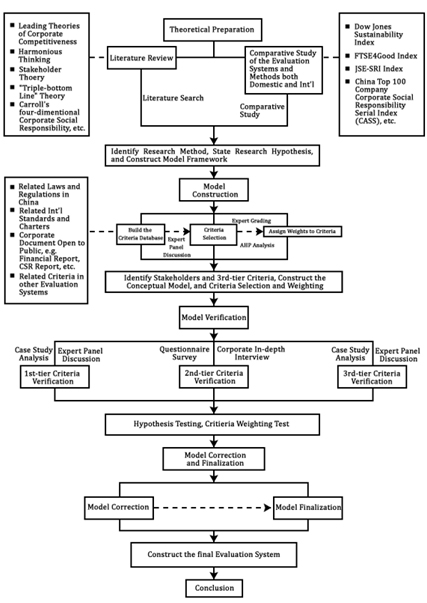CIBE Foreign Invested Enterprise CSR Performance Research
Overview
The Foreign-invested Enterprise CSR Performance Assessment Project, initiated and implemented by the Center for International Business Ethics (CIBE), proposes to develop the first comprehensive stakeholder-based CSR assessment model specifically for Foreign Invested Enterprises (FIEs, incl. representative offices, Equity Joint Ventures, Cooperative Joint Ventures, Wholly Owned Foreign Enterprises and companies limited by shares) in China, to enable FIEs to effectively evaluate the degree by which stakeholder concerns are reflected and integrated into their business strategy.
The project is structured around insights into stakeholder theory, a management theory, which views business as a set of interwoven relationships among groups that either affect or are affected by the activities of that business. From the perspective of stakeholder theory, a business is considered successful only insofar as it can effectively balance and generate value for its stakeholders.
An additional application of the research will be to provide Chinese stakeholders, chiefly the government and NGOs, a clearer awareness and basis on which they themselves can judge the social performance of individual FIEs in China; and foreign direct investment overall. This would constitute a major contribution and an essential component to debate on sustainable growth in China, and help in setting the agenda for policy-making with regards to Foreign Direct Investment (FDI).
Following the growing discourse on the role of FDI in China, this research is premised on the belief that the main obstacle in achieving successful stakeholder management for FIEs in China is the lack of suitable information on stakeholders concerns, and the absence of a clear framework from which management staff can practically approach stakeholders. A key task of this project therefore is to identify the key Chinese stakeholders; their values; the power, legitimacy and urgency of their claims; FIE responsibilities, opportunities and challenges; and effective strategies to measure and manage these responsibilities.
The project, a Stakeholder Model for CSR assessment system of FIEs in China aims to deliver:
1) A significant body of research and contribution to scholarly understanding on stakeholder values in China. Findings will be published in Chinese and English language academic papers, made available for civil society and governmental organizations to support research and decision-making.
2) The establishment of a feasible Stakeholder CSR assessment tool to help FIEs manage their CSR programs in China, to measure and improve corporate social performance with respect to Chinese stakeholders. This tool will primarily take the form of a book containing guidelines for managers in FIEs.
The CSR assessment model constructed will be the first of its kind based on stakeholder theory for FIEs in the Chinese context. It will provide manageable operative criteria for FIEs who are struggling to counter corruption and are seeking sustainable business development in China and other areas.
Methodology
The FIE research has been designed at the Center for International Business Ethics (CIBE) during Spring 2011.
The project employs various research methodologies including a literature review, business and stakeholder surveys, management and stakeholder focus groups, business case studies and expert consultations (as shown in the following graph).
The research has been divided into two main streams of analysis: two rounds of interviews and online collection of data through a questionnaire, a broad-spectrum assessment to get to a definition of CSR for China and a more focused, stakeholder based, one to verify and derive practical applications for the findings from the former.

Figure: Research roadmap
Timeline of the research
The first round of interviews has been carried out during Summer 2011. The preliminary results from that have been bases and references to 1) create a definition of CSR for China, 2) verify and revise the theoretical assessment model, 3) fine-tune the methodologies adopted in interviews and on-line surveys, including structure and content.
As next steps for 2012, we will enter the second phase of the interview process. Interviews will be conducted according to a break down in 5 groups of stakeholders selected based on the preliminary results:
1. Shareholders
2. Customers
3. Employees
4. Suppliers
5. Environment
Starting from “shareholders” we will select a representative sample of 15 companies for an in-depth assessment of their business conduct through a one-hour interview based on semi-structured questions which will be then compared and analyzed along a list of stakeholder based criteria, to identify the best and limited performers in terms of CSR and the causing factors for this difference in performance; the results will later be integrated into the phase three research and assessment model, which will help to distinguish the best performers and the less effective ones with suggestions for improvement.
With the data collected and analyzed in phase two, the on-line and CATI (Computer Assisted Telephone Interview) questionnaire will be designed and adjusted for phase three quantitative research, and we will identify possible channels for its promotion in order to raise its scientific accuracy.
There are some milestones in FIE projects:
- Paper on theoretical research phase:
"Achieving sustainability with a stakeholder-based CSR assessment model for FIEs in China". Published in JIBE, Vol.3 No.1 2010
- Report on preliminary survey of about 50 FIEs and managers in China (please visit: http://www.cibe.org.cn/en/page/Default.asp?pageID=181)
- Conclusion: paper on the findings of the research:
"Stakeholder Perspectives on Corporate Social Responsibility (CSR) of Multinational Companies in China", published in JIBE, Vol.6 1-2, 2013
| 